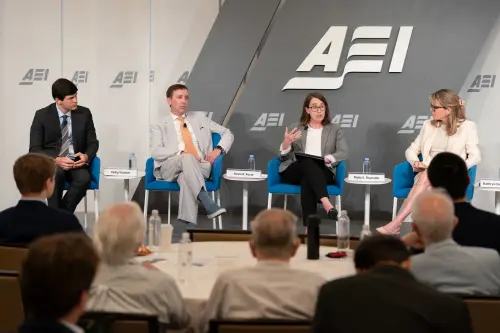The World Trade Organization (WTO) Ministerial Conference ended six days of trade talks in Hong Kong. The conference focused on the Doha Development Agenda, a series of negotiations on economic development which will be vital in moving forward and reaching a new general free trade agreement.
Lael Brainard, Vice President and Director, Global Economy and Development Center and New Century Chair in International Economics, discussed the issues ahead. See also her remarks at a panel discussion entitled The Doha Round; Where are we Headed? (http://www.cfr.org/publication/9352/)
Q: Delegates in Hong Kong managed a last-minute breakthrough on farm subsidies, saving the talks from complete failure. What are your thoughts on this outcome?
A: The best that can be said of the Hong Kong ministerial is that it succeeded in keeping hope alive, but just barely. The outcome — or lack of one — comes as no surprise but is deeply disappointing nonetheless. The agreement was a modest advancement towards bridging some of the differences between the EU and U.S., as well as between the developed and developing world. Going forward, the major players have to lift their levels of ambition and the political capital they are willing to expend if they are serious about making the global economy work for the poor.
Q: Agriculture is not the only, but it’s the big stumbling block at the moment. What are your views on that?
A: The most hotly contested issue is likely to be agricultural trade, the same issue that derailed the 2003 ministerial conference in Cancun. I think it’s interesting that there are a variety of persistent self delusions on the part of the developing countries.
If you look at most of the credible estimates of what you get from liberalization, agriculture gives the biggest gains for the developing countries. Over half of those gains come not from the rich countries’ moves, but actually from developing countries’ moves. We should and do care a lot about continued manufacturing liberalization, especially among the developing countries. And there’s a fair amount of south-south gains as well. But for the Europes and the Japans, they’d actually gain a lot from their own agricultural liberalization.
Q: The European Union has insisted that it cannot substantially broaden the cuts it prepared for the previous, unsuccessful ministerial conference two years ago in Cancun, and France has vowed to block any expanded initiative. What are your thoughts?
A: It is a little astonishing that one country can hold up the entire world on agriculture. I think France’s position is unbelievably powerful. And you really do have to ask the question whether the European Union has been a good or bad thing for liberalization if it gives France that amount of power.
If I were sitting Chirac’s position, I would certainly not put any priority on giving something internationally on agriculture. He has enough problems at home, and it is such an explosive issue. So I don’t know about that, but the commission is out ahead of France and trying to pull them along.
Q: What do you see at the U.S.’s role in these talks moving forward?
A: U.S. politics are very interesting. We have a whole series of things that are kind of coming together as we run into 2007. We’ve got the farm bill that will be rewritten next year. We’ve got an awful situation on the budget and we’re looking for savings wherever we can find them. And if we have meaningful liberalization on the part of some of the developing countries, on the part of the EU, the administration could make a serious argument that this is a good deal and take it. Now the things that weigh against that is that if you look at the electoral map, the Republican base is very, very heavily concentrated in rural areas. And so it’s very, very difficult for the Republican party to take on a really big liberalization move. And the other things that will be difficult is if you get outside of that summer of 2007 window, you have the expiration of fast track authority, which is not fatal.
Q: Are regional free trade agreements distraction rather than a step forward?
A: I would make a very important distinction between a large regional grouping, like the Free Trade Area of the Americas, where what you’re doing is you are pushing down barriers among a large group of countries who will be natural trade partners because of their proximity anyway, and doing one-off deals with countries with which you don’t have particularly deep trade ties to begin with, for reasons that have often little to do with economics.
Q: One thing that’s been said about the Doha Round is that the way to judge whether it’s successful or not is how much does it do for the developing countries. Who is going to lose the most if it doesn’t work out?
A: Brazil, from agriculture liberalization, will be a huge gainer. India, if it actually is forced into doing some dismantling, will go through a very painful transition period. But in the end, the estimates are positive there, too. Some of the poorest countries will not gain as much. And I think that’s also very important to recognize.
There are about 50 countries that are net food importers. Many countries actually benefit from the subsidies that are out there. And so it’s a more complicated distributive pattern than, the advocacy groups would like us to believe. But the reality is that, again, there aren’t that many places you can look to do an international agreement where you can boost incomes on a permanent basis by close to one percent of GDP.
Q: Would the poorest countries lose by withdrawal of agricultural subsidies?
A: Some of the poorest countries will actually gain. It’s really a case by case. We shouldn’t oversell trade, which I personally have experienced several times, and have lived with the aftermath. Trade is redistributed, and we should be very, very clear about that, and the public discourse should reflect that.
For those countries which actually are net food importers, which are unlikely to gain, we should make sure we have a policy that will cushion the impact for them. We can debate whether it should be food aid or not or whether it should be straight aid — but we should proactively have plans for those countries. We’ve never done that in the past.



Commentary
The Doha Round: Now Where Are We Headed?
December 5, 2005